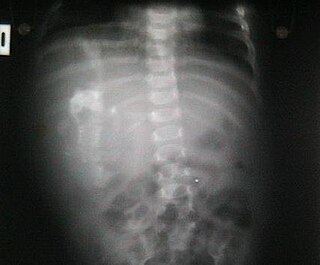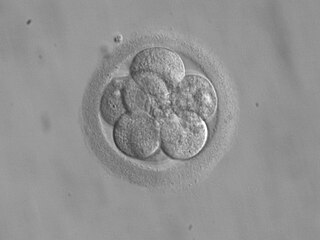Fetus or foetus refers to a stage in prenatal development.
Fetus or Foetus may also refer to:
- Foetus (band)
- Foetus (film), a 1994 Hungarian film
- Fetus in fetu, a developmental abnormality
- Campylobacter fetus , a species of bacteria
Fetus or foetus refers to a stage in prenatal development.
Fetus or Foetus may also refer to:
Male, in biology, is the half of a sex system that produces sperm cells.
Null may refer to:
Obstetrics is the field of study concentrated on pregnancy, childbirth and the postpartum period. As a medical specialty, obstetrics is combined with gynecology under the discipline known as obstetrics and gynecology (OB/GYN), which is a surgical field.

Embryology is the branch of animal biology that studies the prenatal development of gametes, fertilization, and development of embryos and fetuses. Additionally, embryology encompasses the study of congenital disorders that occur before birth, known as teratology.
Numerous religious traditions have taken a stance on abortion but few are absolute. These stances span a broad spectrum, based on numerous teachings, deities, or religious print, and some of those views are highlighted below.
Nail or Nails may refer to:
Flow may refer to:

Fetus-X was a weekly romantic horror comic written and drawn by Eric Millikin and Casey Sorrow. Millikin is an American artist and former human anatomy lab embalmer and dissectionist. Sorrow is an internationally known American illustrator and printmaker.

Obstetric ultrasonography, or prenatal ultrasound, is the use of medical ultrasonography in pregnancy, in which sound waves are used to create real-time visual images of the developing embryo or fetus in the uterus (womb). The procedure is a standard part of prenatal care in many countries, as it can provide a variety of information about the health of the mother, the timing and progress of the pregnancy, and the health and development of the embryo or fetus.

Fetus in fetu is a rare developmental abnormality in which a mass of tissue resembling a fetus forms inside the body of its twin. An early example of the phenomenon was described in 1808 by George William Young.
In religion and philosophy, ensoulment is the moment at which a human or other being gains a soul. Some belief systems maintain that a soul is newly created within a developing child and others, especially in religions that believe in reincarnation, that the soul is pre-existing and added at a particular stage of development.

Tritrichomonas foetus is a species of single-celled flagellated parasites that is known to be a pathogen of the bovine reproductive tract as well as the intestinal tract of cats. In cattle, the organism is transmitted to the female vagina and uterus from the foreskin of the bull where the parasite is known to reside. It causes infertility, and, at times, has caused spontaneous abortions in the first trimester. In the last ten years, there have been reports of Tritrichomonas foetus in the feces of young cats that have diarrhea and live in households with multiple cats. Tritrichomonas foetus looks similarly to Giardia and is often misdiagnosed for it when viewed under a microscope.
The Web Cartoonists' Choice Awards (WCCA) were annual awards in which established webcartoonists nominated and selected outstanding webcomics. The awards were held between 2001 and 2008, were mentioned in a New York Times column on webcomics in 2005, and have been mentioned as a tool for librarians.
In Judaism, views on abortion draw primarily upon the legal and ethical teachings of the Hebrew Bible, the Talmud, the case-by-case decisions of responsa, and other rabbinic literature. While all major Jewish religious movements allow or encourage abortion in order to save the life of a pregnant woman, authorities differ on when and whether it is permitted in other cases.
A fetus or foetus is the unborn offspring that develops from a mammal embryo. Following embryonic development, the fetal stage of development takes place. In human prenatal development, fetal development begins from the ninth week after fertilization and continues until the birth of a newborn. Prenatal development is a continuum, with no clear defining feature distinguishing an embryo from a fetus. However, a fetus is characterized by the presence of all the major body organs, though they will not yet be fully developed and functional and some not yet situated in their final anatomical location.

The beginning of human personhood is the moment when a human is first recognized as a person. There are differences of opinion as to the precise time when human personhood begins and the nature of that status. The issue arises in a number of fields including science, religion, philosophy, and law, and is most acute in debates relating to abortion, stem cell research, reproductive rights, and fetal rights.

Kuman Thong is a household divinity of Thai folk religion. It is believed to bring luck and fortune to the owner if properly revered. Kuman, or Kumara (Pali) means "Sanctified young boy" ; thong means golden.
Foeticide, or feticide, is the act of killing a fetus, or causing a miscarriage. Definitions differ between legal and medical applications, whereas in law, feticide frequently refers to a criminal offense, in medicine the term generally refers to a part of an abortion procedure in which a provider intentionally induces fetal demise to avoid the chance of an unintended live birth, or as a standalone procedure in the case of selective reduction.
The Garbha Upanishad, or Garbhopanishad, is one of the minor Upanishads, listed number 17 in the modern anthology of 108 Hindu Upanishadic texts. Written in Sanskrit, it is associated with the Krishna Yajurveda by some, and as a Vedantic Upanishad associated with the Atharvaveda by other scholars. It is considered one of the 35 Samanya (general) Upanishads. The last verse of the Upanishad attributes the text to sage Pippalada, but the chronology and author of the text is unclear, and the surviving manuscripts are damaged, inconsistent with each other and incomplete.

Prevenge is a 2016 British comedy slasher film written by, directed by and starring Alice Lowe in her directorial debut. The film also stars Kate Dickie, Kayvan Novak, Jo Hartley, Mike Wozniak, Gemma Whelan and Tom Davis. The plot follows a pregnant widow who is convinced her foetus is compelling her to embark on a killing spree as revenge for the death of her husband.